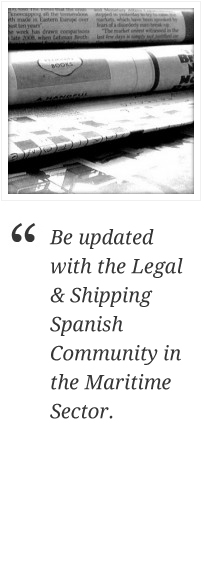April: CIRCULAR 1B/2000
NUEVA LEY DE EXTRANJERÃA. CÓMO AFECTA A LOS CASOS DE POLIZONAJE Y LOS TRANSITARIOS?
Tras varias discusiones entre los diferentes partidos polÃticos, la nueva Ley de ExtranjerÃa nº 4/2000 entró en vigor el pasado dÃa 1 de Febrero. Esta nueva Ley se adapta a los postulados del Tratado de Ãmsterdam y regula los derechos y libertades de los extranjeros en España, asà como su integración social. El Gobierno tiene seis meses desde esa fecha para aprobar el Reglamento que desarrolle esta Ley.
Following strong government discussions, the new Spanish Statutory law number 4/2000 on the status of a foreigner came into force last 1.02.00. This new law adapts to the postulates of the Amsterdam treaty and regulates the rights and liberties of foreigners in Spain and their social integration. The Government -right wing- has six months from this date to approve the Regulation of this Statutory rule.
What is interesting about this new law is the recognition of the rights and social integration of foreigners. Spain is therefore now one of the chosen goals for stowaways, who also cross the Spanish borders hidden in legitimate freight transport. However, the title of Expels and Sanctions of this new law is quite strict.
RIGHT OF ASSISTANCE BY AN OFFICIAL LAWYER AND AN INTERPRETER. According to article 20, foreigners have the right to be assisted by an official lawyer appointed by the Bar Association and by an interpreter on the administrative proceedings that deny their entry into Spain, that expel them from Spain, or on asylum proceedings. This would mean no cost for the Member, in case of stowaways, reducing therefore the cost of the mutual insurance. While the Home Office understands that, according to this new law, the right of assistance by an official lawyer to foreigners whose entry in Spain is denied does not include those immigrants who try to enter illegally into Spain, the Deans of the Bar Associations of Barcelona and Madrid understand that the new law guarantees the assistance by an official lawyer in all cases.
EXCEPTIONAL REASONS OF ENTRANCE INTO SPAIN. According to article 23.4, to those foreigners who do not comply with the requirements of the law to enter into Spain, their entry can be authorized due to the following exceptional reasons: humanitarian, public interest or completion of compromises acquired by Spain. However a political will together with an appropriate approach to the authorities are needed to apply this article in order to try to obtain i.e., for humanitarian reasons, the disembarkation of the stowaways who enter Spain illegally across the Straits of Gibraltar.
MINORS. According to article 32, if the Police find a foreigner without documentation and it cannot be determined whether he is a minor or not, the Police will inform the Minor Courts in order to determine his identity, age and personal circumstances. This is important as up till now the Spanish Police were not obliged to inform and therefore they would simply not allow the minor stowaway’s disembarkation from the vessel -or from a vehicle inside a vessel- alleging that he was not a minor.
INFRACTIONS AND FINES. Article 50 determines the severe infractions (“INFRACCIONES GRAVES”). According to art. 50.c) it is a severe infraction: “TO INDUCE, PROMOTE, FAVOUR OR FACILITATE, FORMING PART OF A PROFIT-MAKING ORGANIZATION, THE ILLICIT INTEGRATION OF PEOPLE IN TRANSIT OR WITH DESTINATION TO SPANISH TERRITORY”.
Article 51 sanctions the previous infraction with a fine of from one million to ten million pesetas.
Furthermore, the law 4/2000 modifies the Spanish Penal Code introducing a new Title: Title XV bis. Its new article 318 bis says: “THOSE WHO PROMOTE, FAVOUR OR FACILITATE THE ILLEGAL TRAFFIC OF PEOPLE IN TRANSIT OR WITH DESTINATION TO SPANISH TERRITORY WILL BE PUNISHED WITH JAIL FROM SIX MONTHS TO THREE YEARS AND A FINE OF FROM SIX TO TWELVE MONTHS, OR WITH JAIL FROM TWO TO FOUR YEARS AND A FINE OF FROM TWELVE TO TWENTY FOUR MONTHS“.
Besides, article 55 of the law 4/2000 says that those foreigners who are illegally in Spain will not be expelled if they denounce the perpetrator of the illicit traffic of people, or if they provide relevant information to the Police. This could be dangerous if an illegal immigrant -whether stowaway escaped or not- decides to denounce a driver or a road haulier in order not to be expelled -whether it is true or not that he arrived to Spain in the denounced lorry-.
Therefore, road hauliers/freight forwarders should be very careful as they could now be facing a sanction of up to Ptas. 10,000,000 according to articles 50 and 51 of the 4/2000 new law if the vehicle is understood to have facilitated the entry of illegal immigrants into Spain forming part of a profit-making organization, and the driver could also be imprisoned according to new article 318 bis of the Spanish Penal Code.
All the necessary and relevant information/documentation should be obtained from the driver/road haulier/freight forwarder carrying stowaways to best protect Members’ interests. An appropriate approach to the authorities is also needed in order to find possible solutions that can satisfy all parties.

